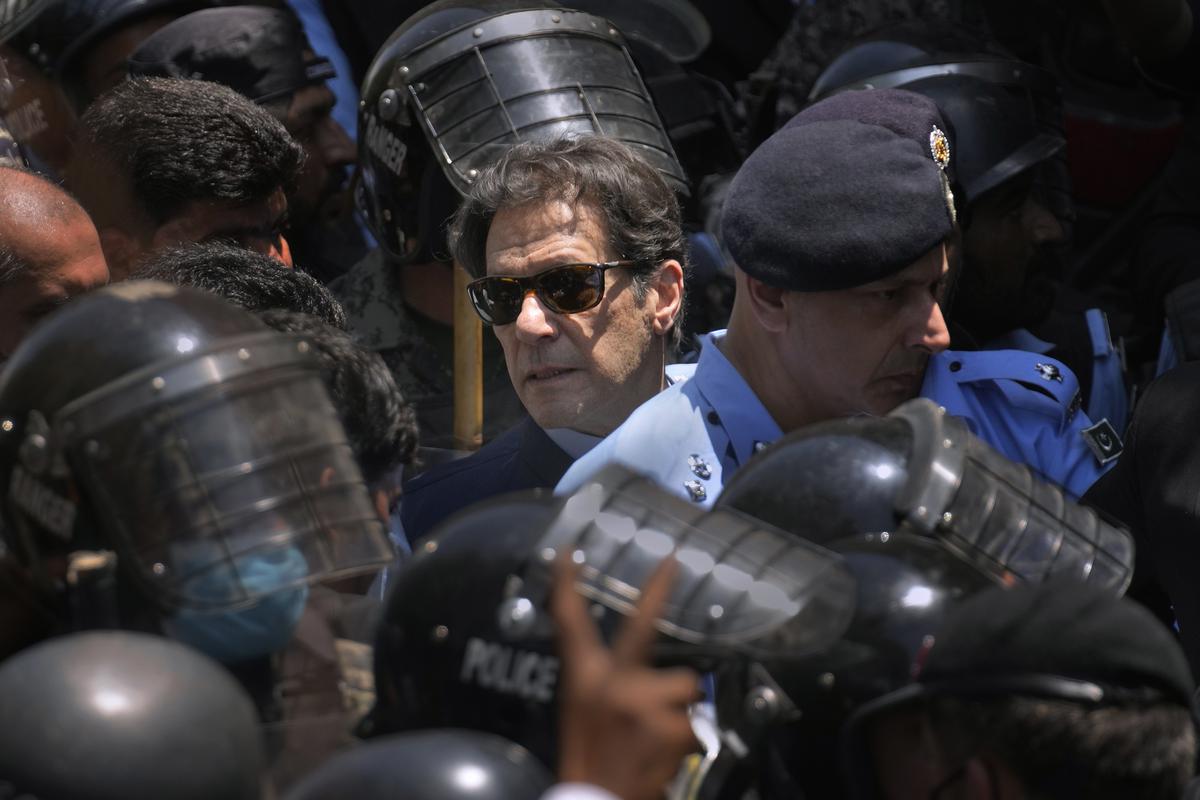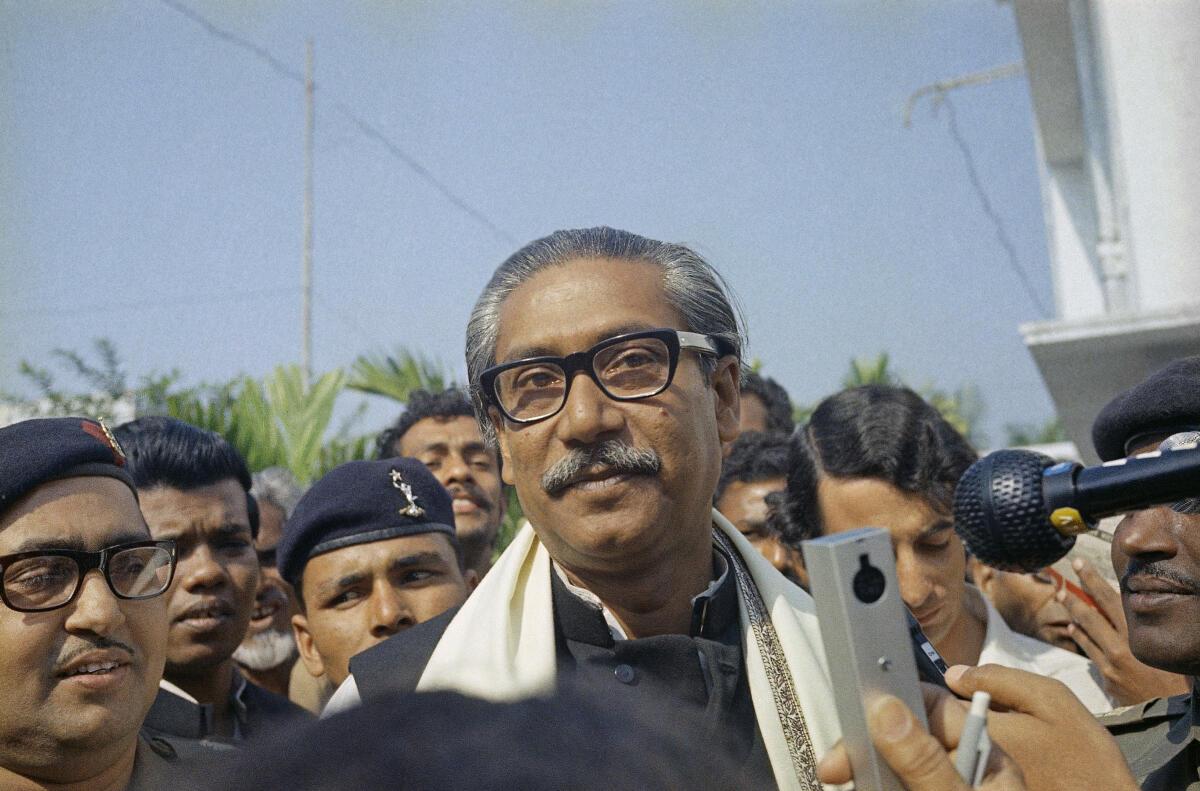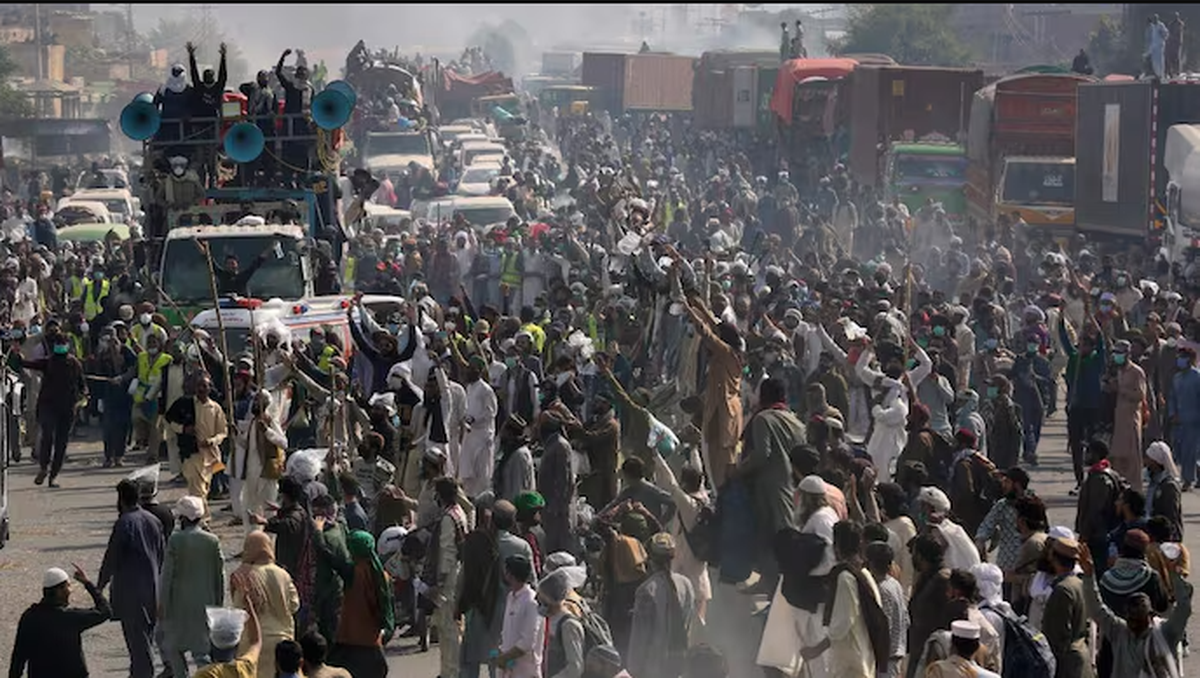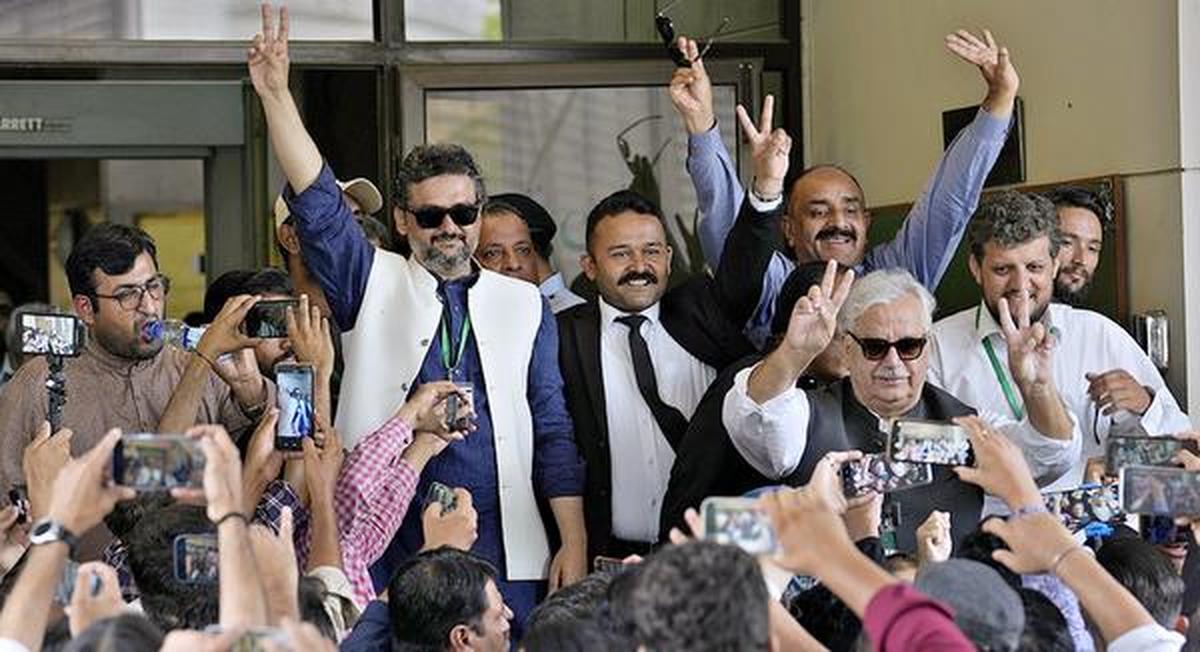The story to date: Pakistan’s authorities, on July 15, introduced its plan to ban Pakistan Tehreek-e-Insaf (PTI), the occasion of former Prime Minister Imran Khan, for alleged anti-state actions. The 71-year-old cricketer-turned-politician, who misplaced a vote of no-confidence in 2022 and was ousted from his Prime Ministerial publish, has been lodged at Adiala Jail in Rawalpindi since August 2023, in reference to varied circumstances.
In a press convention, Data Minister Attaullah Tarar introduced, “In view of the international funding case, the Might 9 riots, and the cypher episode in addition to the decision handed within the U.S., we consider that there’s very credible proof current to have Khan’s occasion, the Pakistan Tehreek-e-Insaf (PTI), banned”.
He added that the federal government will file circumstances in opposition to Mr. Khan and former Pakistan president Arif Alvi for treason below Article 6. “Our persistence and tolerance are thought of as our weaknesses. The PTI and Pakistan can not co-exist as the federal government is attempting to stabilise the nation politically and economically, whereas efforts are being made to thwart its efforts,” Mr. Tarar mentioned. A petition will probably be filed for a similar in Pakistan’s apex courtroom, he added.
The stunning transfer comes mere days after a 13-judge bench of the nation’s Supreme Court docket dominated that PTI was eligible for seats reserved for girls and minorities within the nationwide and provincial assemblies. PTI had approached the apex courtroom after the Peshwar Excessive Court docket and the Election Fee of Pakistan (ECP) had disallowed PTI-backed candidates who had gained these reserved seats within the elections held in February.
Supporters of former Prime Minister Imran Khan’s occasion, the Pakistan Tehreek-e-Insaf (PTI), wave flags as they protest demanding free and truthful outcomes of the elections, in Peshawar, Pakistan February 17, 2024. REUTERS/Fayaz Aziz
| Picture Credit score:
Reuters
The PTI, which had been stripped off its iconic ‘bat’ electoral image by the ECP, fielded its candidates as independents within the nationwide elections in February. Of the 272 seats in direct contest, PTI-backed Independents gained 92 seats, rising as the most important bloc, however fell in need of a majority. With the SC validation of the PTI winners from reserved seats, the bloc, which has now aligned itself with the Sunni Ittehad Council (SIC,) would be the largest occasion within the Nationwide Meeting with 109 seats.
Right here’s a take a look at why PTI could also be banned and what occurs subsequent
Why is PTI being banned?
In April 2022, the Opposition coalition led by Pakistan Muslim League-Nawaz (PML-N) and Pakistan Folks’s Social gathering (PPP) moved a vote of no confidence in opposition to Imran Khan within the Nationwide Meeting, accusing him of corruption, financial mismanagement, depletion of international trade reserves and hovering inflation. Mr. Khan claimed a “international conspiracy” was searching for to oust him attributable to his “unbiased international coverage,” saying {that a} senior U.S. diplomat was concerned in it. Then-Speaker Asad Qaiser known as for a vote however then-Deputy Speaker Qasim Suri (who’s related to PTI) dismissed the movement on the day of voting, deeming it unconstitutional.
Fearing a belief vote loss, Mr. Khan suggested the then-President Arif Alvi to dissolve the Meeting and put together for contemporary polls. This dissolution was termed unconstitutional by the SC and a 13-hour-long belief vote was held, which culminated in Mr. Khan’s ouster as 174 lawmakers of the 342-member Meeting voted in help of the no-confidence movement. Shehbaz Sharif, chief of the PML-N and brother of former Prime Minister Nawaz Sharif, took over because the Prime Minister.
After Mr. Khan’s ouster, former Pakistani ambassador to the U.S., Asad Majeed, who had authored a cypher despatched to Islamabad in 2022, clarified that there was no risk. Mr. Khan had touted this cypher as a base for his claims {that a} “international conspiracy” was attempting to topple to his authorities.
Citing these actions, the present authorities has determined to maneuver a case in opposition to Mr. Khan, Mr. Alvi and Mr. Suri for treason. “You tried to wreck the nation’s diplomatic relations for the sake of your political pursuits and went on to get a decision handed in opposition to Pakistan within the U.S,” mentioned Mr. Tarar.
On Might 9, 2023, Mr. Khan was arrested in reference to a corruption case whereas he was showing in an Islamabad courtroom. His arrest led to lethal riots throughout Pakistan, with scores of his supporters taking to the streets, vandalising at the very least a dozen navy installations together with the ISI constructing in Faisalabad, and pelting stones on the police. PTI blamed the Pakistan Military for orchestrating his arrest. The Military cracked down closely on the protestors, arresting them and attempting them in navy courts.

Pakistan’s former Prime Minister Imran Khan, middle, is escorted by cops as he arrives to seem in a courtroom, in Islamabad, Pakistan, Friday, Might 12, 2023. A excessive courtroom in Islamabad has granted Khan a two-week reprieve from arrest in a graft case and granted him bail on the cost.
| Picture Credit score:
Anjum Naveed
In the meantime, the Supreme Court docket deemed Mr. Khan’s arrest unlawful, giving him momentary reduction. His reprieve was short-lived, as police arrested Mr. Khan in Lahore after he was sentenced to a three-year jail time period for illegally promoting state items.
Mr. Khan has been additionally charged for leaking state secrets and techniques by publicising the cypher communication between the federal government and the embassy. In complete, Mr. Khan faces 100 circumstances; he has been convicted and acquitted in some circumstances, and been barred from contesting elections for 5 years.
The present authorities has used these circumstances because the bulwark of its determination to ban PTI and cost Mr. Khan and prime PTI leaders with treason. It claims that the riots and the makes an attempt by a number of PTI leaders to sabotage Pakistan’s cope with the Worldwide Financial Fund (IMF), has compelled its hand.
What are the reactions?
The choice to ban PTI has been criticised by events throughout the political spectrum.
Accusing the federal government of punishing the PTI for being declared as the most important occasion within the Meeting, Chief of Opposition Omar Ayub Khan claimed that the federal government wished to scare 240 million individuals by means of coercion, intimidation and harassment, in response to Daybreak report.
Asserting that PTI was not one to be intimated, he mentioned that it will not be potential to crush the most well-liked political occasion with blind drive nor might any optimistic end result be anticipated from it.
Equally, PPP, a coalition associate of PML-N, has distanced itself from the transfer, claiming its management was not consulted. PPP veteran Mian Raza Rabbani mentioned that the banning of a political occasion by the federal government was in opposition to all norms of democracy. “Because the nation is already dealing with grave financial and political instability, such a step will add political chaos and lavatory down the financial system,” mentioned Mr. Rabbani in a press release, including, “The step of banning a political occasion in Pakistan’s historical past has at all times been unsuccessful and been thrown into the dustbin of historical past.”
Different political events like Awami Nationwide Social gathering, Jamiat Ulema-i-Islam, and Jamaat-i-Islami too have rubbished the transfer, terming it ‘infantile’ and ‘unconstitutional’ and saying that the transfer won’t stand in courtroom. Even the Human Rights Fee of Pakistan has criticised the choice, say that it ‘reeks of political desperation.’
The US State division has maintained that whereas it opposes such restrictions, the announcement to ban PTI was a part of a ‘complicated political course of,’ reported Daybreak. “As these inside processes proceed to play out, we are going to monitor these choices and any additional choices,” mentioned its spokesperson. India has not but launched any assertion on this situation.
Precedent to political events’ ban in Pakistan
Since its formation in 1947, democracy in Pakistan has been interspersed with Military regimes. Nonetheless, even when a democratically elected authorities has been in energy, political events have confronted bans, finds an evaluation by Daybreak.
In 1954, the Communist Social gathering of Pakistan was banned for its alleged involvement in a navy coup deliberate by Main Normal Akbar Khan to topple the primary authorities in unbiased Pakistan headed by Liaquat Ali Khan.

A 1972 file photograph of Bangladesh Premier, Sheikh Mujibur Rahman
The Awami League, a breakaway Bengali faction of the All India Muslim League fashioned in 1954, steadily gained reputation in East Pakistan and swept all however two seats within the 1970 elections. The navy authorities headed by Normal Yahya Khan banned the occasion, resulting in protests, battle, genocide and finally the beginning of Bangladesh.
Two events — Jeay Sindh Qaumi Mahaz (JSQM) and the Awami Nationwide Social gathering — that are nonetheless in existence, have seen factions being banned.
The Nationwide Awami Social gathering, based in 1957, first confronted a ban in 1958 when Normal Ayub Khan imposed martial regulation. As soon as the ban was lifted in 1962, it splintered into factions, with the NAP-Wali rising as the most important one. In 1975, the PPP authorities led by Zulfikar Ali Bhutto banned the mum or dad occasion NAP for backing Baloch separatists. Its faction NAP-Wali re-emerged because the Awami Nationwide Social gathering (ANP) and is now in alliance with the PPP.
JSQM’s faction led by Abdul Wahid Aresar was banned in 2020 by the Imran Khan authorities for its alleged hyperlinks with Sindh separatist militant outfits – Sindhu Desh Revolution Military (SRA) and Sindhu Desh Liberation Military (SLA) – who routinely carried out assaults on navy personnel, police and many others.

Supporters of Tehreek-e-Labbaik Pakistan, a radical Islamist occasion, participate in a protest march towards Islamabad, on a freeway within the city of Sadhuke, in jap Pakistan in October 2021
Tehreek-i-Labbaik Pakistan (TLP), based in 2015, is without doubt one of the current outfits to be banned attributable to its violent protests and blatant help for Mumtaz Qadri – an commando who assassinated former Punjab governor Salman Taseer. Whereas it was initially banned in April 2021, the ban was lifted by the Imran Khan authorities in October 2021 after its protests floor Islamabad to a halt. The occasion’s reputation has diminished after its founder Khadim Rizvi died.
What will probably be PTI’s destiny?
Within the wake of backlash by a number of of its alliance companions, the PML-N management has toned out its assault on PTI. A senior PML-N chief has clarified that no ultimate determination has been made relating to a everlasting ban on PTI, reported Daybreak.
“We have to seek the advice of our management and allies on this regard. Any determination to ban PTI will probably be made in accordance with the regulation and Structure,” mentioned Deputy Prime Minister Ishaq Dar. As per Pakistan Structure’s Article 17, the ultimate determination to ban a political occasion rests with the Supreme Court docket.

Historic victory: Supporters of Tehreek-e-Insaf occasion react after the Supreme Court docket verdict in Islamabad, Pakistan, on Friday. AP Anjum Naveed
| Picture Credit score:
Anjum Naveed
“The Supreme Court docket is unlikely to ratify a ban on the PTI because it has already declared PTI as a political occasion,” says geopolitical analyst Aishwaria Sonavane. Noting the recognition Mr. Khan at the moment enjoys, she provides, “A ban will solely foment public sympathy for Imran Khan. Additionally bans have confirmed futile in eliminating public help and can result in additional political instability”.
Whereas Mr. Khan’s political future hangs within the stability attributable to his authorized troubles, PTI’s future as a political drive appears stronger. With the current beneficial SC rulings and Pakistan’s personal historic failure to snuff out political events utterly, it appears that evidently PTI’s huge public help will assist in its continued existence as PTI or as one other political occasion – much like the ANP.




